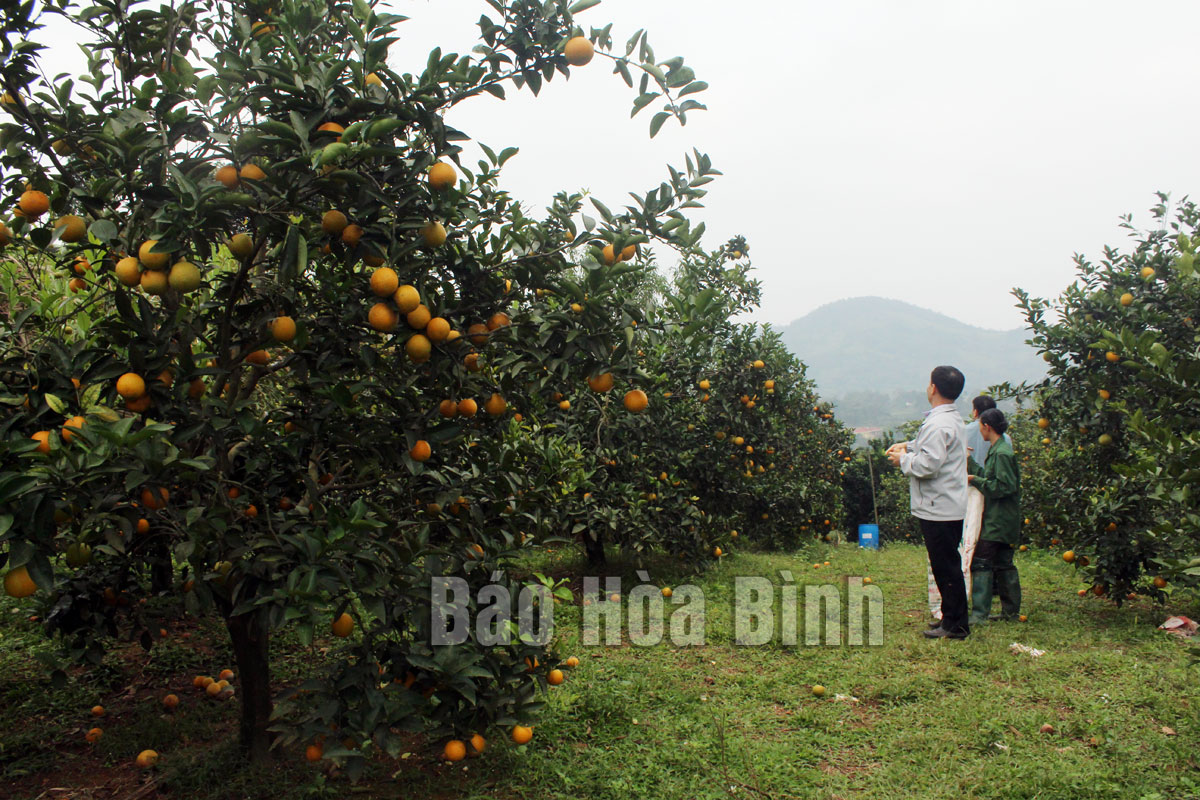
(HBO) – The Hoa Binh provincial People’s Committee issued Document No 2114/UBND-KTN, dated December 1, 2022, on the implementation of the agriculture ministry’s plan on developing key fruit trees by 2025 and 2030.
Residents in Thach Yen commune, Cao Phong district, have harvested profits from
citrus tree farming.
On October 27, 2022, the Minister of Agriculture
and Rural Development issued Decision No 4085/QD-BNN-TT to approve a plan on
developing key fruit trees by 2025 and 2030. In this plan, Hoa Binh province
was tasked with developing orange and pomelo cultivation.
To effectively carry out assigned tasks, the
provincial People’s Committee requested that in terms of orange and pomelo
farming, the People’s Committees of district-level localities press on with
implementing citrus tree re-cultivation measures assigned by the provincial
administration in Decision No 2078/QD-UBND, dated September 16, 2021, which
approved the province’s plan on citrus tree re-cultivation for 2021 - 2025,
with a vision to 2030.
In terms of other fruit trees, including banana,
longan, pineapple, passion fruit, and temperate fruits, authorities were told
to base on localities’ conditions to set up development orientations for the
trees their localities are strong at, ensure stable sale to improve
competitiveness, and connect farming with processing and sale to raise fruits’
added value and secure sustainable development.
Besides, localities need to combine the
development of fruit tree cultivation zones with existing socio-economic
development programmes to maximise their potential and advantages.
They were also asked to form large-scale farming
zones, ensure stable supply and consistent quality, good look of fruits to meet
consumer demand, flexibly apply mechanisms and policies to encourage investment
in line with socio-economic development plans, and increase attracting
investment to sustainable development to achieve the plan’s targets.
In addition, the provincial People’s Committee
also assigned plan implementation tasks to relevant departments and sectors./.
The Standing Board of the Hoa Binh provincial Party Committee has agreed in principle on a proposal by the Standing Board of the Party Committee of Hoa Binh city to gather feedback on the city’s 1:2000 zoning plan, which forms part of its broader urban development strategy.
Hoa Binh province has made notable progress in public administration reform and digital government development, with the satisfaction index among citizens and businesses reaching over 84%, according to recent government evaluations.
Thanks to great efforts by local authorities in recent times, the governance and public administration performance of Mai Chau district has been significantly improved.
In the afternoon of June 6, the Party Committee, the People's Council, the People's Committee and the Fatherland Front of Lac Son district solemnly held a meeting to celebrate the 139th anniversary of the district's founding (1886–2025) and the 79th anniversary of the establishment of the district's Party Committee (1946–2025). There was the attendance of Mr. Bui Van Thang, the Vice Chairman of the Provincial People's Council; Mr. Quach Tat Liem, the Vice Chairman of the Provincial People's Committee; Ms. Dang Bich Ngoc, the Deputy Head of the National Assembly Delegation of the province; as well as the former leaders of the province and district through various periods, who are the natives of the district.
Implementing the Politburo’s Resolution No. 57-NQ/TW on breakthroughs in science – technology, innovation, and digital transformation is a golden opportunity for the northern mountainous province of Hoa Binh to renew growth model, improve competitive edge and shorten digital gap.
Resolution 57-NQ/TW, issued by the Politburo on December 22, 2024, identifies sci-tech, innovation, and digital transformation as strategic breakthroughs to build a developed and prosperous nation. In Hoa Binh province, this spirit is not just a slogan, it’s being put into action through concrete initiatives that form a "new development triangle”: digital citizenship, digital economy, and digital administration.



